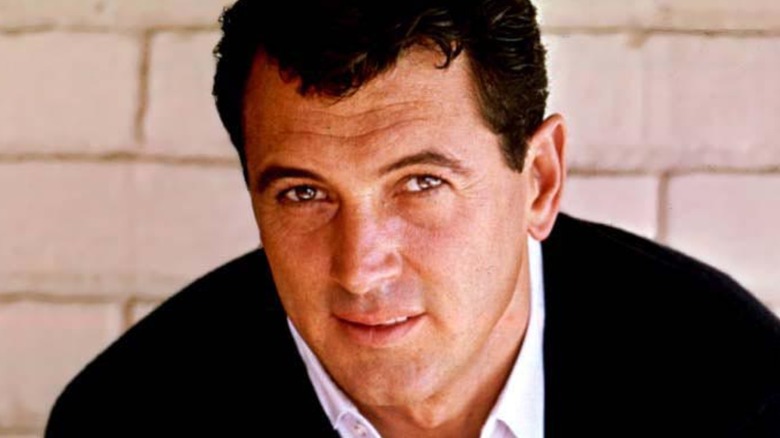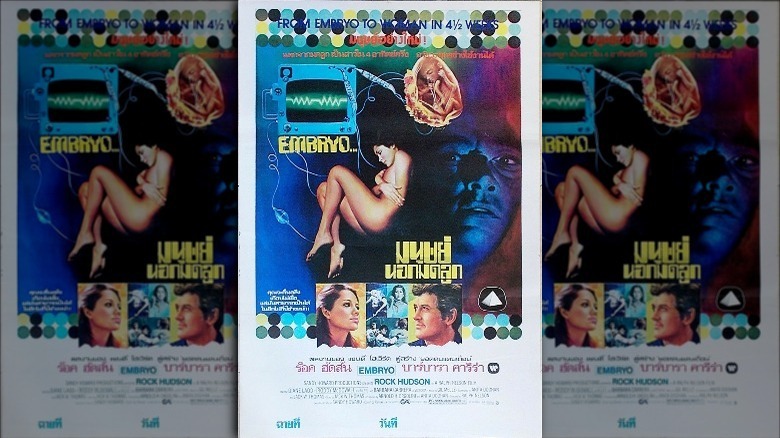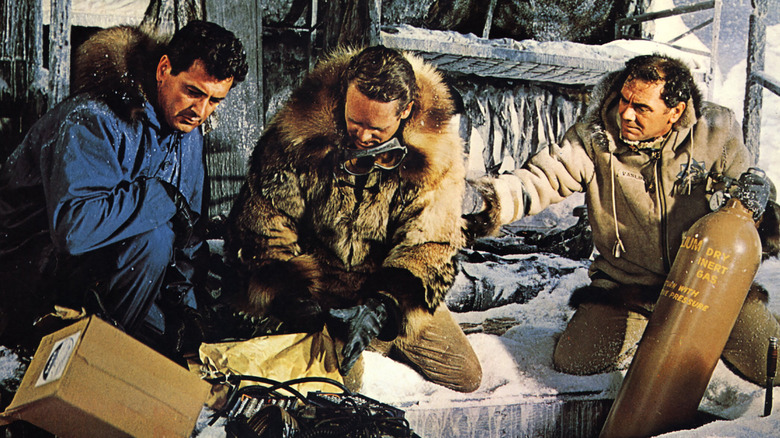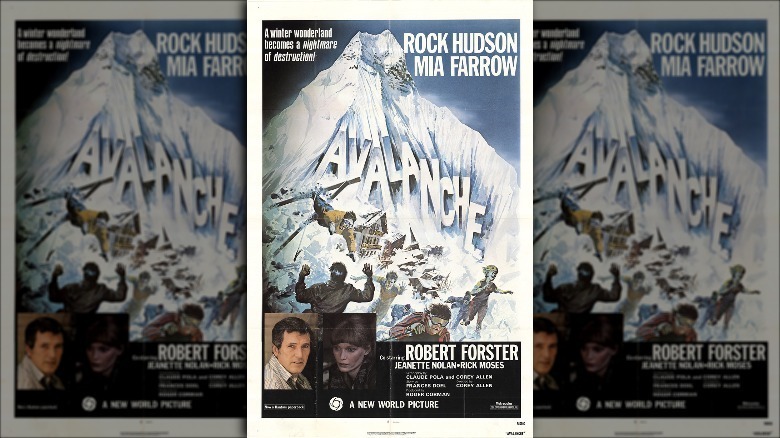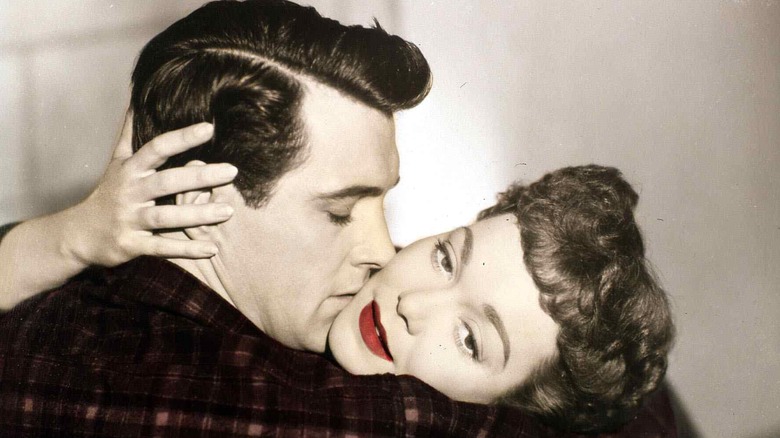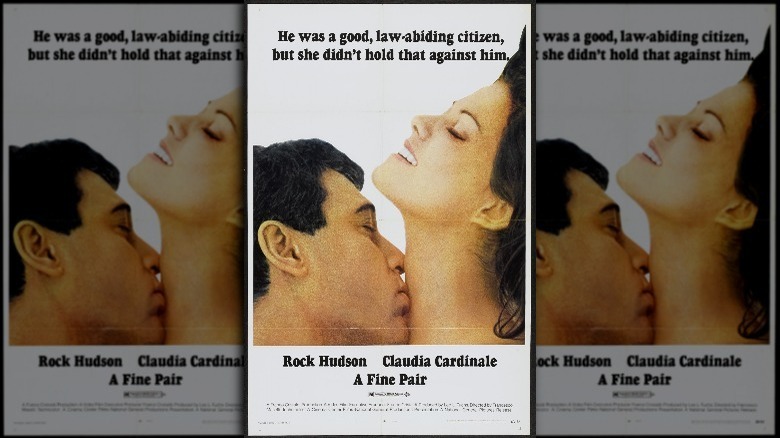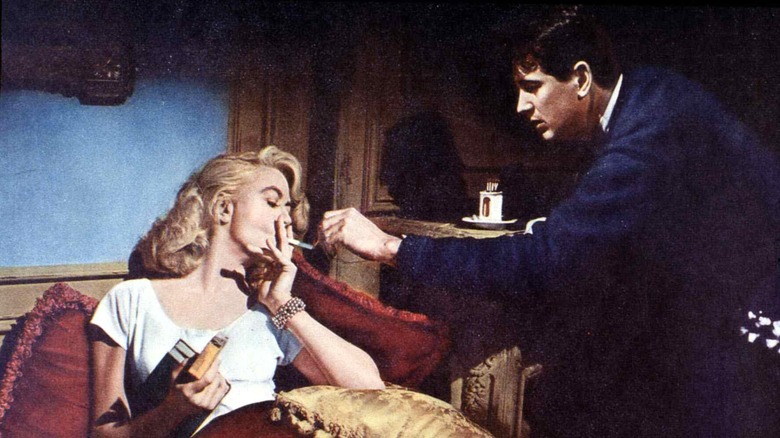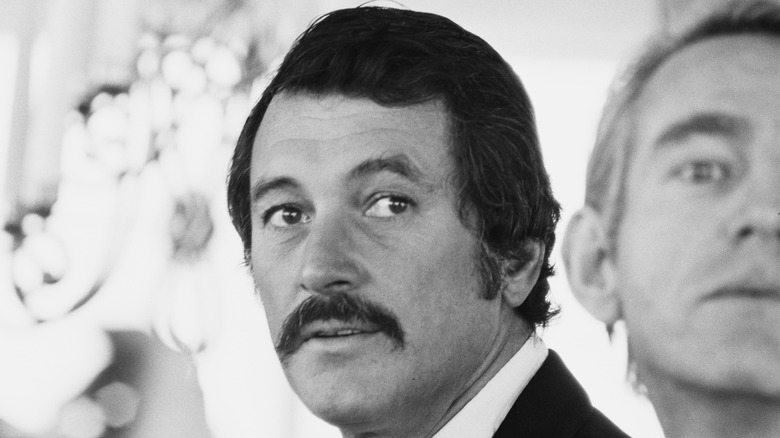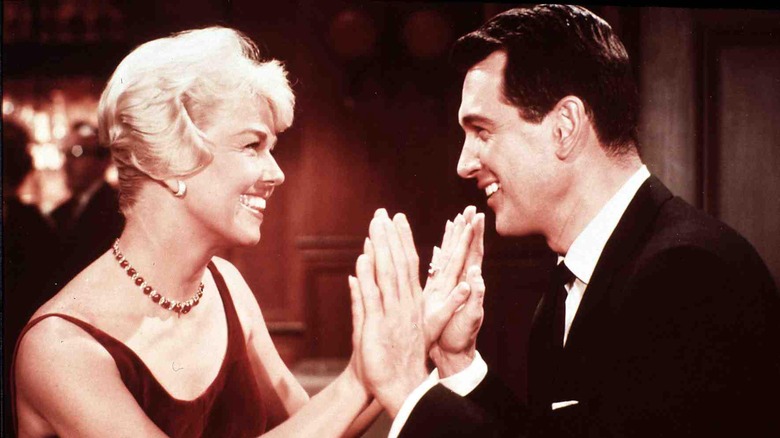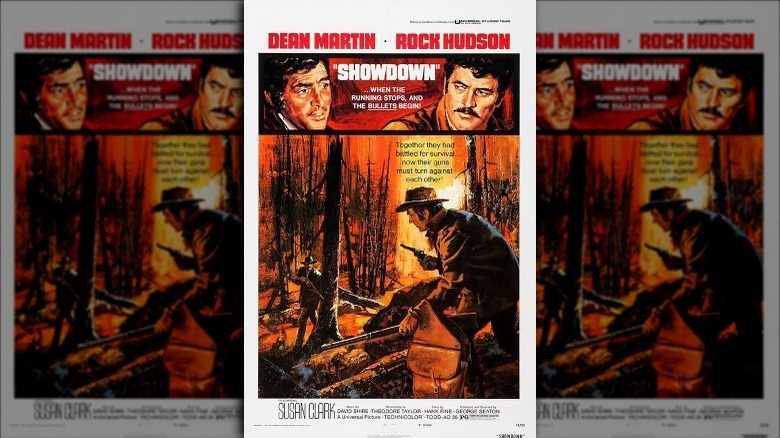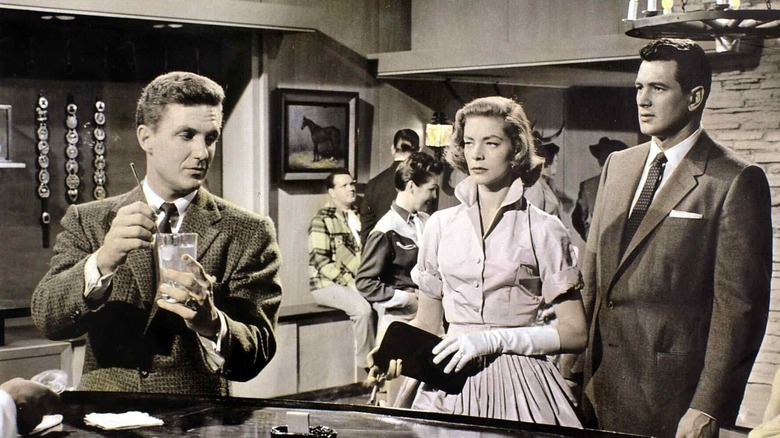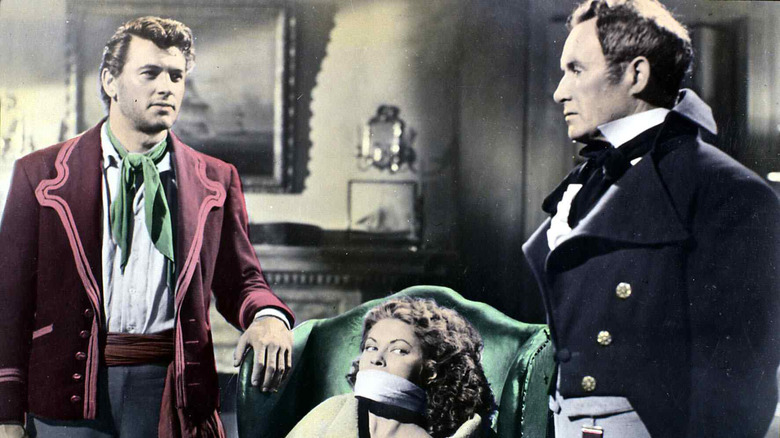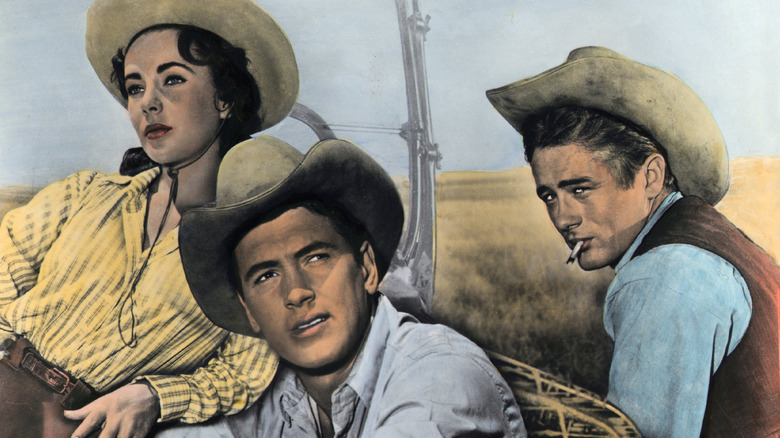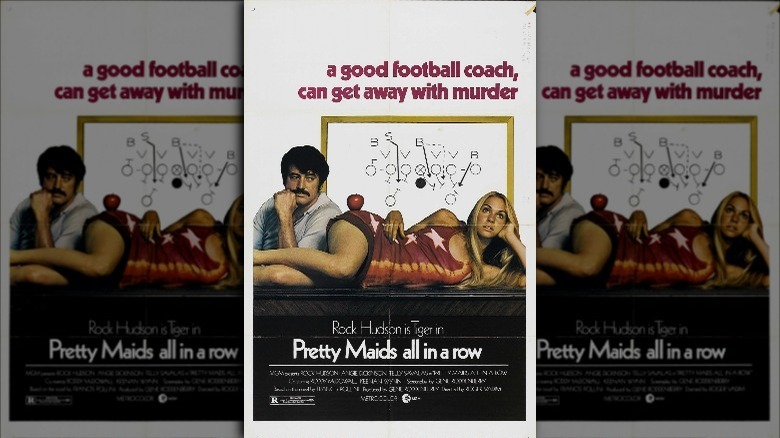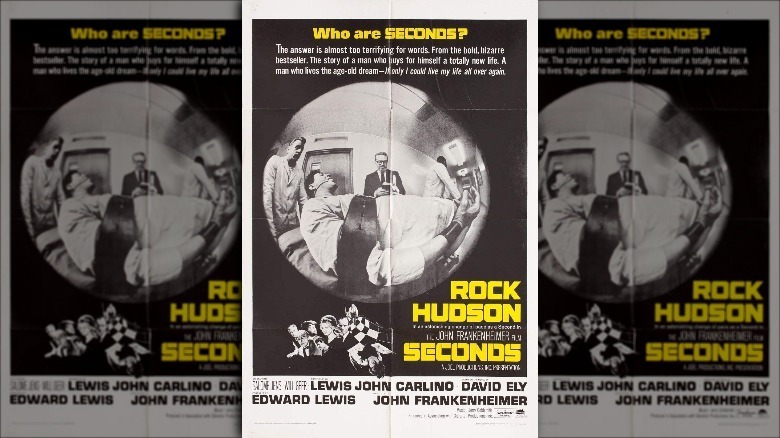The 7 Best And 7 Worst Rock Hudson Movies
Rock Hudson has a complicated legacy as a celebrity and a artist. He burst onto the Hollywood scene in the 1950s and uncomfortably straddled the old and the new. Where other young actors like James Dean and Marlon Brando were pursuing more modern acting techniques and reinventing what it meant to be a film actor, Hudson was more of a traditional studio creation, a square-jawed all-American heartthrob.
Born Roy Harold Scherer Jr. in Winnetka, Illinois, Hudson was also a closeted homosexual throughout his career. His death of AIDS-related complications at the age of just 59 changed the public's perception of him. The fact that his illness and death followed a lengthy career decline meant that Hudson's acting career rarely gets an objective overview. Although Hudson was sometimes dismissed as just a remarkably good-looking man, he had real performing talent and has some truly great performances on his résumé. But his legacy is complicated by the many truly terrible films he appeared in, especially in the last two decades of his life.
As a result, Hudson can be legitimately remembered as both a good and bad actor — there's plenty of evidence for both. For your consideration, here are the seven best and seven worst Rock Hudson movies.
Embryo (1976): intensely silly science-fact thriller
By 1976, Rock Hudson was no longer a top box office draw. Middle-aged and a little pudgy, he found himself starring in "Embryo," a film The New York Times described as a "tax-shelter entry" that was "an embarrassing updated version of 'The Bride of Frankenstein.'" The Los Angeles Free Press chimed in by saying "the movie's directed with turgid sentimentality ... and acted with a stolid boredom by Rock Hudson."
The story involves a scientist who develops a process that speeds up the aging and development of a fetus, allowing him to grow first a dog and then a woman (played by Barbara Carrera) in his lab in just a few days. The woman is a genius, and all sorts of truly horrific ethical problems ensue. It's all very silly and not particularly well-made, and it marks an absolute low point for everyone involved — even Carrera, despite the fact that this was just her third film.
The film's so bad that no one seems to care about its copyright: According to Public Domain Movies, the studio, Cine Artists Pictures, went out of business before renewing its claim — and no one ever followed up.
Ice Station Zebra (1968): criminally underrated
No one will ever consider spy thriller "Ice Station Zebra" a classic, but it's often underrated. The New York Times calls it "a fairly tight, exciting, Saturday night adventure story" and a "good, man's action movie" (though it also notes acidly that not a single woman appears in the film).
Rock Hudson plays an American submarine commander who picks up a British agent (played by Patrick McGoohan) on a secret mission to the North Pole with dire consequences for the world. Variety praised Hudson's performance, saying he "comes across quite well as a man of muted strength," and the film builds effective tension as various characters converge on the North Pole, with the U.S. and its allies racing the Russians to recover sensitive satellite photos at the remote station.
The film also looks great, though the plot does get a bit convoluted and difficult to follow. In the final analysis, it's a solid espionage adventure film with some standout performances, and probably the last truly good movie that Rock Hudson appeared in.
Avalanche (1978): got the Mystery Science Theater treatment
Roger Corman is renowned as a filmmaker who perfected turning ultra-low-budget films into profit-making dreck, as well as a mentor to an entire generation of filmmakers who got their first experience working on one of his projects. In 1978, writer and director Corey Allen, who went on to be an Emmy-winning television director, got his chance with Corman and Rock Hudson on the film "Avalanche."
As noted by Cinema Retro, "Avalanche" was conceived as a way to cash in on the fleeting "disaster movie" fad of the 1970s. Hudson plays the owner of a ski resort who ignores all sensible advice and cuts down a bunch of trees to improve the view for his rich guests. When the inevitable avalanche hits, there's nothing to slow it down, and so the film's all-star cast (including Mia Farrow) find themselves in a series of poorly filmed pickles.
The Washington Post describes the film as a "shambles," and that's a little kind, actually. According to The Durango Herald, "Avalanche" was considered bad enough to have featured on "Mystery Science Theater 3000" in 2017, which was actually the most sustained critical attention the film had ever received.
All That Heaven Allows (1955): true romance
Rock Hudson was perfect for the role of Ron, a gardener working for wealthy, beautiful widow Cary (Jane Wyman). Cary longs for another chance at true love, but her friends encourage her to settle down with someone her own age and social status for "companionship." Then she spots a sweaty Rock Hudson working in her yard, and all bets are off, though the scandal causes everyone a lot of heartache.
As The A.V. Club notes, it's melodrama — but it's perfect melodrama that succeeds at exactly what it's trying to be. Hudson himself isn't exactly brilliant in the role, but he's perfectly competent once you get past the dated shock value of a wealthy woman dating an employee. The Guardian placed "All That Heaven Allows" at number 11 on its list of best romantic films of all time, writing that the movie "offers smart insights into the American class system and carries a powerful emotional clout way beyond the usual limitations of its genre." It's not the most surprising of films, but what it does it does very well.
A Fine Pair (1969): the worst kind of heist movie — boring
The late 1960s saw Rock Hudson's career entering a steep decline. Just a few years before, he'd been one of the biggest stars in the world, but changing times left him looking more and more like a relic. "A Fine Pair" is meant to be a brisk, sexy heist movie, but The New York Times describes it as "soggy" and says, "Rarely has international jewel thievery ... seemed like more work and less fun."
Hudson plays a no-nonsense, conservative New York City police captain who is approached by Esmeralda (Claudia Cardinale), the daughter of an old friend, an Italian police officer. Esmeralda tells Hudson that she's stolen some jewels from a wealthy family but has had an attack of scruples and asks for his help breaking into their heavily fortified castle to put the jewels back before their theft is noticed. There are, predictably, twists. And also a creepy love affair between the 40-ish Hudson and a girl who regards him as something of an uncle.
The end result is summed up nicely by Cinema Retro: "The movie is the kind of lazy effort that makes one suspect the only motives for the stars' participation were quick, sizable paychecks and the opportunity to enjoy some exotic locations at the studio's expense."
The Tarnished Angels (1957): complex and melancholy
An adaptation of William Faulkner's novel "Pylon," this film initially flopped but has risen in critical estimation over the years — as Pop Matters notes, it's now considered to be one of the best Faulkner adaptations ever made.
The story is focused on Roger Shumann (Robert Stack), a former World War I pilot who makes a living during the Great Depression by flying a daredevil act while his beautiful wife LaVerne (Dorothy Malone) performs parachute stunts that show off her legs. Rock Hudson is an alcoholic journalist who becomes obsessed with both. It's a sad, powerful character study that revels in the doom that surrounds all of these characters. In other words, it is the perfect Faulkner adaptation.
The Guardian calls the film "a polished psychological melodrama, meticulous in its subtle observation," and notes that Faulkner himself approved of the film, calling it "pretty good, quite honest." Even more than 60 years on, it's well worth seeking out, and it contains one of Hudson's best performances. For once, he's more than just an improbably handsome man; he's a character struggling between vanity and soul-chilling depression, uncertain about everything. And he's terrific doing it.
Hornet's Nest (1970): off-putting and dull
Rock Hudson made his bones in Hollywood as a handsome, athletic type. He found success in films where he looked great and wooed beautiful women, most notably in the romantic comedies he made with Doris Day. By 1970, those kinds of films weren't being made much, and Hudson tried to pivot. Unfortunately, "Hornet's Nest" is an odd, off-putting war film described by critic Dennis Schwartz as "overlong, tedious and strident."
The film is based on a true story, which doesn't reduce its weirdness one bit. Hudson plays a paratrooper who drops behind Nazi lines to destroy a dam. His team is ambushed, and he is badly injured. Found by a group of Italian children whose parents were massacred by the Nazis, he's treated by a beautiful German nurse the kids have kidnapped. They want him to teach them how to handle guns so they can kill Nazis. And he does. And they do.
As The New York Times says, the film has "faults on almost every level you can imagine." Audiences found the sequences where children murder Nazis with abandon to be alternatively disturbing or silly, which is also a good way to describe the film.
Pillow Talk (1959): peak Day/Hudson chemistry
When you think of the films of Rock Hudson, you probably think of the cheesy, saccharine romantic comedies he made with Doris Day. And they are cheesy and saccharine — but the first of them, "Pillow Talk," is also a really fun movie, and one of Hudson's best.
The story is prime cheese: Day and Hudson are neighbors in an apartment building who know each other only through their shared party line telephone (a relic of the times). Hudson is a serial seducer, and Day is a lonely career woman. When they finally meet in person, Hudson decides to adopt the persona of a wealthy, moralistic Texan in order to mess with Day. As one does. Naturally, the two fall in love.
As The A.V. Club notes, the script won an Academy Award (as did Day, for Best Actress) and perfectly balances a touch of naughty sexiness with an essentially wholesome concept of true love. The Hollywood Reporter notes that the direction is actually quite sophisticated for all the primary colors of its set design, and this is the film that established Hudson could be a skilled comedian and not just a bare-chested hunk of beefcake.
Showdown (1973): cliche-packed and Dean Martin
Rock Hudson should have known better: By 1973, co-starring with Dean Martin was not a good sign for the state of your career. Martin had long ago given up any pretense of effort in his acting roles, and "Showdown" is no exception. As Tony Mastroianni wrote in the Cleveland Press, "'Showdown' is a tired western. Everyone in it is tired. The only suspense in the film is watching a tired Dean Martin and a tired Rock Hudson getting on their horses. Sometimes you think they won't make it."
The plot has few surprises: Martin and Hudson grew up together as best friends in the Old West before falling out over a woman, and now Martin is an outlaw and Hudson the lawman. They're at odds and dragging tons of baggage, but in the end join forces against a common enemy. It's not exactly the most original of stories, in other words. Classic Film Freak sees some redeeming value in the movie but also acknowledges that it's "full of clichés and an overall lack of originality."
Written on the Wind (1956): a brilliant satire
"Written on the Wind" is one of director Douglas Sirk's best films. It's a sophisticated production that employs a lot of subtle trickery — as Roger Ebert notes, many of the backgrounds are purposefully fake-looking or inaccurate in order to create a tension between what you're seeing and what you're feeling. The story follows two wealthy heirs, Marylee (Dorothy Malone) and Kyle (Robert Stack), who are ruined by their money and privilege. Marylee is in love with their childhood friend Mitch (Rock Hudson), who, in turn, falls in love with Kyle's new wife Lucy (Lauren Bacall).
Melodrama, yes, but as Variety notes, it's melodrama with "tiptop scripting" and "dramatically deft direction." The key, as Ebert argues, is to view the film as a satire that is meant to be "subversive of all the 1950s dramas that handled such material solemnly." The artificiality of the sets, the effects, and even the performances are all on purpose to underscore just how tawdry these stories are, how they really have nothing to say about the human condition. It's a strange, brilliant film, and Hudson held his own in it.
Sea Devils (1953): wasting a hot Hudson
In 1953, Rock Hudson was hot, both physically and career-wise. Just 28 years old, Hudson was a rising star with a bodacious body, and the one smart thing this film does is get his shirt off as often as possible. According to author John Mercer, the filmmakers weren't too excited about the script, considering it "mundane," and that attitude shows in the end result.
According to Slant Magazine, the problems extend to the performances. Hudson plays a fisherman forced into smuggling by the depredations of the Napoleonic Wars who becomes entangled with a wily, sexy double agent played by Yvonne De Carlo. The performances are broad and theatrical, hinting that everyone involved knew they were making a stinker — and that the only way to save it was to get Rock's clothing off.
It's not just the performances, though — the film is assembled in a jerky, poorly edited manner that wastes some truly spectacular scenery, as well as the technicolor processing used on the production. Luckily, this lackluster effort didn't hurt Hudson's career much — he was just a few years from his breakout roles.
Giant (1956): a true epic
"Giant" is often discussed solely in the context of James Dean, as if he was the only actor appearing in it. The film more or less defines the word "epic," telling the story of a wealthy rancher (Rock Hudson) who marries Leslie (Elizabeth Taylor) when he buys a prize horse from her family. Back in Texas, they start a family and fall into a rivalry with a cowboy (Dean) who strikes it rich in oil.
It's pretty critical of Texas and Texan culture at the time. It's also long (more than three hours!) — but it's great. Variety says it's "an excellent film which registers strongly on all levels, whether it's in its breathtaking panoramic shots of the dusty Texas plains; the personal, dramatic impact of the story itself, or the resounding message it has to impart."
The Hollywood Reporter notes that the film received 10 Academy Award nominations (it won for Best Director) and praises it as "giant in size, giant in ambition, giant in the human emotions that are generated by the massive forces of nature and human development." In other words, it's well worth the three-hour investment.
Pretty Maids All in a Row (1971): The misfire
While "Pretty Maids All in a Row" is not a good film, it's elevated by its high-energy weirdness. It's one of those movies you can't be sure was meant to be taken seriously, so it hovers in a quantum state between terrible and simply misguided.
By 1971, Rock Hudson's career wasn't going well, and this was a risk that, in an alternate universe, revived it. In the film (written by Gene Roddenberry of "Star Trek" fame!), Hudson plays a horny high school guidance counselor and football coach who may or may not be murdering the many young (underage) girls he's being seduced by. He takes a horny young man under his wing and convinces a fellow teacher played by Angie Dickinson to seduce the kid as a form of therapy. Or something. Yeah, it's pretty cringey.
Roger Ebert's review pulled no punches, saying, "The movie itself is, finally, embarrassing." But as The Aisle Seat argues, while "Pretty Maids All in a Row" is not "a good film by any traditional measure," the movie is "a genuine curio" due to its strange 1970s vibe and approach to sex, which might make it worth checking out.
Seconds (1966): a truly disturbing, brilliant film
The A.V. Club put it bluntly: By 1966, Rock Hudson's career was "dying." He was over 40, and the romantic comedies that had made him a huge star were over. Instead of chasing after them, Hudson made "Seconds," a terrifying and unusual film about an old banker who pays to have his consciousness transferred into the body of, well, Rock Hudson. Suddenly younger and gorgeous, he will be free to live whatever life he chooses!
Yeah, it doesn't go well. Director John Frankenheimer slowly grinds Hudson's character into a nightmare, in the process massaging out Hudson's best performance ever. With a pitch black ending that offers absolutely no comfort or release, it's also easy to see why the film remains a bit of an acquired taste even if you're a huge Frankenheimer or Hudson fan. But as noted by The Atlantic, although the film was widely misunderstood at the time of its release (and perhaps hindered by Hudson's casting, which confused people who might have embraced this arty, dark vision), it has slowly become a classic.
